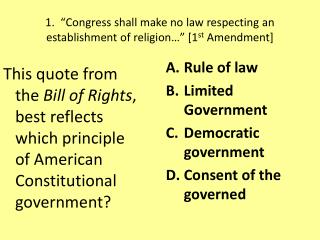

Virtually all jurists agree that it would violate the Establishment Clause for the government to compel attendance or financial support of a religious institution as such, for the government to interfere with a religious organization’s selection of clergy or religious doctrine for religious organizations or figures acting in a religious capacity to exercise governmental power or for the government to extend benefits to some religious entities and not others without adequate secular justification. All states disestablished religion by 1833, and in the 1940s the Supreme Court held that disestablishment applies to state governments through the Fourteenth Amendment. The language of the Establishment Clause itself applies only to the federal government (“Congress shall pass no law respecting an establishment of religion”). The Establishment Clause of the First Amendment, principally authored by James Madison, reflects this consensus. Delaware, New Jersey, Pennsylvania, Rhode Island, and much of New York had no established church.Īfter Independence, there was widespread agreement that there should be no nationally established church.
#Respecting an establishment of religion license
Dissenters were often punished for preaching without a license or refusing to pay taxes to a church they disagreed with.

In those colonies, clergy were appointed and disciplined by colonial authorities and colonists were required to pay religious taxes and (often) to attend church services. America’s early settlers came from a variety of religious backgrounds: Puritans predominated in New England Anglicans predominated in the South Quakers and Lutherans flocked especially to Pennsylvania Roman Catholics settled mostly in Maryland Presbyterians were most numerous in the middle colonies and there were Jewish congregations in five cities.ĭuring colonial times, the Church of England was established by law in all of the southern colonies, while localized Puritan (or “Congregationalist”) establishments held sway in most New England states.


 0 kommentar(er)
0 kommentar(er)
